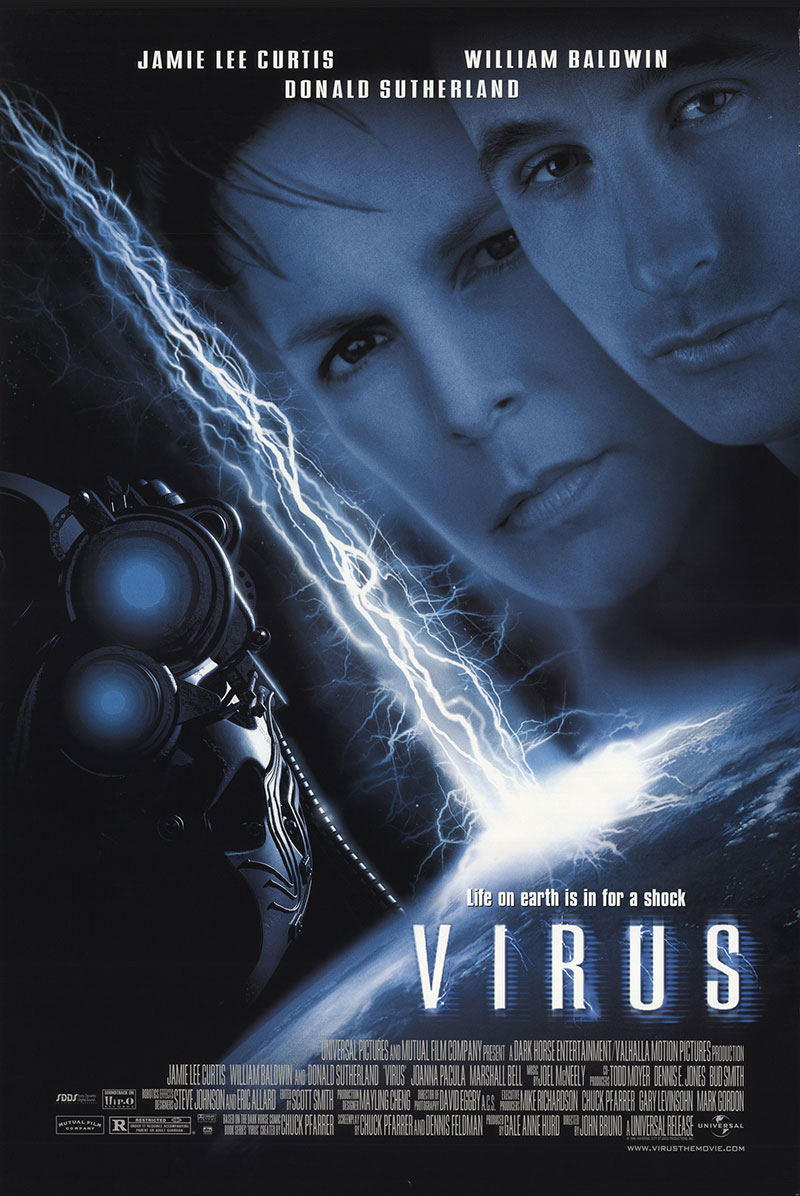Once upon a time, the moviegoing public wasn’t assaulted by an endless stream of comic book movies from Marvel and DC. Back in the dark days of 1999, the Batman cinematic franchise was on life support after Joel Schumacher finished with it, and Marvel’s properties had been farmed out to Sony. The only two movies of any significance based on comics that year was Mystery Men, which was a big budget flop, and Virus, which was an even bigger big budget flop. Both of these titles came from Dark Horse Entertainment, and may have a lot to do with the slow pace of further adaptations from the Dark Horse stable, when compared with what Marvel and DC are doing.
Virus, from 1999, was adapted from a comic of the same name from writer Chuck Pfarrer (writer of Navy Seals, a grand shitty movie) and artist Howard Cobb that ran for a grand total of four issues. That might be a record for brevity when it comes to source material for a comic book flick, but the story was short and sweet. Pfarrer, with Dennis Feldman, wrote the screenplay, with visual effects veteran John Bruno taking a first turn in the director’s chair.
Somewhere in the Pacific Ocean, a cyclone is raging. This is bad news for the crew of the Sea Star, a salvage tug captained by Robert Everton (Donald Sutherland and an intermittent, unidentifiable accent). Everton’s crew is getting paid on commission, Everton put everything he had into recovering the wayward barge they’re towing, and  none of it is insured. Of course, the storm sinks the barge, and the tug suffers heavy damage. The only hope they have of survival is to proceed into the eye of the storm, and carry out what repairs they can, there.
none of it is insured. Of course, the storm sinks the barge, and the tug suffers heavy damage. The only hope they have of survival is to proceed into the eye of the storm, and carry out what repairs they can, there.
The crew is the motley assemblage one finds in an ensemble cast of mercenary-types in a horror flick. There’s the Ellen Ripley/MacReady analogue in Kit Foster (Jamie Lee Curtis); the Hicks analogue in Steve Baker (William Baldwin); and the fodder, featuring That Guy Marshall Bell, That Guy Cliff Curtis, That Guy Julio Oscar Mechoso, and Sherman Augustus. All that’s missing is Joe Pantoliano or Keith David.
The crew of the Sea Star is about ready to call it a day and sink, when they get a radar hit of another vessel nearby. After hailing it and getting no response, they steam to its position and discover it is the Russian science vessel Vladisov Volkov, which had been on duty in the Pacific communicating with the MIR space station.
Unbeknownst to the prematurely relieved Sea Stars, the Volkov has been adrift since it received a massive burst of energy from the MIR. Up in low Earth orbit, the MIR drifted through some mysterious energy band, and some of this energy shot down through the atmosphere and infected all computer systems with an alien, energy-based lifeform. This lifeform is much more intelligent than human beings, and took over all ship’s systems, forcing the surviving crew to shut down all power and wait, hopefully, for rescue. Unfortunately for the Russians, the damage to ship and crew was too much, and their rescuers turn out to be a bunch of scavengers.
That’s a pretty cool idea for a horror flick.
What has made this film so anonymous since its release was not the idea. It was all in the execution. There was some depth to the original story, but this film has been Hollywoodized to quite an extent. Originality has been supplanted by the type of monster flick in a contained environment with which potential viewers will be very familiar. It’s an Alien ripoff. It’s an Aliens ripoff. It’s a ripoff of The Thing. It’s a ripoff of The Terminator at points. It’s a ripoff of ripoffs. It rips off so many other films that I’m shocked it’s not still in litigation.
The Sea Stars spend all movie battling the lifeform and the hybrid corpse/electronic machines it creates. We all know what’s coming, and that undermines much of the effort that was put into sets, the acting, and the excellent effects work. A big chunk of this flick’s budget had to have gone to Sutherland, Baldwin, and Jamie Lee Curtis, yet the producers kept aside a nice chunk of change for the effects. They are tip-top for the tail end of the practical effects era.
I’ve seen Virus a few times over the last twenty years, and while I’m never put off by it (including by Baldwin’s acting), I’ve always had a hard time remembering what I just watched after it was over. That’s not a good sign.
